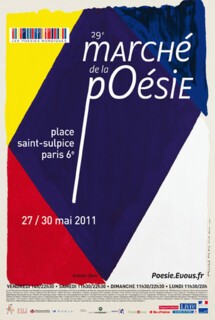In Paris
Stephanie Burt
Jessie and I were making our way to the Métro from the Jardin du Luxembourg when we literally stumbled – I think I tripped over a microphone cable – into the 29th annual Marché de la Poésie, an open-air, weekend-long festival of poets and poetry, with enough tents, booths, temporary stages, lecterns, folding chairs and rope lines to take up the whole of the Place Saint-Sulpice. The festival is big enough and famous enough to have developed a fringe (périphérie), a set of poetry-related events that continue until late June, in venues from the Portuguese consulate to the Halle St-Pierre in Montmartre. The organisers say that last year there were 509 exhibitors and 60,000 visitors.
As Saturday evening dissolved into night there seemed to be three events going on in the Place Saint-Sulpice: a celebration of women’s writing sponsored by a consortium of French feminist presses, a cocktail party and a poetry reading – all surrounded by white canvas booth after white canvas booth, filled with tables and piles of books. Almost all the poetry was in French, but this year’s marché had a Nordic theme and guests of honour included Kristian Olsen Aaj, ‘écrivain et artiste groenlandais’, whose poems and stories are ‘la plupart en groenlandais et en danois avec ses propres illustrations’.
‘Nous défendons l’économie d’un livre différent,’ the festival programme says; it supports ‘les petits éditeurs’, though there were well produced trade editions for sale too. Moreover, ‘nous défendons le mot, l’image et le son’: not only the kind of poetry that consists of typeset words, in lines, on pages, but also the kinds of poetry that incorporate images, objects, aspects of book production, and non-verbal sounds. I was glad of it: my French-for-reading is hardly what it should be.
The only anglophone – or part-anglophone – booth in the square was the tent run by Francis van Maele of Redfoxpress, based in County Mayo. Van Maele is also one half of the composite book artist and visual poet Franticham. The other half is Antic Ham, who was also there that evening but ordinarily lives and works in Seoul. Redfoxpress makes and sells artists’ books, visual poetry, mail art and mixed media works on a small, affordable scale. C’est mon dada (‘that’s my plaything’ but also ‘that’s my Dadaism’) is a series of palm-sized, cloth-bound artist’s books that owes something to Dada, more to Fluxus, and something to 1980s zine culture: we bought four C’est mon dada books, along with two foldout screenprints by Francticham.
Pierre Garnier has enjoyed a decades-long career as a concrete poet. His C’est mon dada volume, Nanopoems, has sketches and captions in his spidery hand: a crucifix with the legend ‘Le Haut de La Marionette’; a clock face, set to 14:25, with the words ‘Les Enfants du Soleil’. True Confessions of A. Banana, by the apparently celebrated Canadian mail artist Anna Banana, lands somewhere between concrete poetry and miniature postmodern poster art. One red-and-green page says ‘GET FOOD’ in big, vague stencils, with ‘cream cheese’ and ‘cucumber’ in joined-up writing underneath. Another page has mysterious numerals in the far background, the words ‘QUIT GROPE CLUE’ in the foreground, and a blue-and-white Swiss dot pattern, made with a hole-puncher, in between.
Redfoxpress belonged in the marché, as other Irish or English or US or Canadian small presses could not, for reasons that have little to do with van Maele’s francophone origins (he was born in Belgium). Visual poetry, concrete poetry, artist’s books that use words as images, or words as components of images, can work quite well as art even when put in front of readers with a limited grasp on the language. Movements and styles in visual poetry circulate easily beyond the boundaries of the language community in which they begin. You need some French to enjoy Garnier’s sketches, but not very much. No wonder Dada and Fluxus have travelled so well.

Comments
Thanks for that - I was (in rapid succession) pleased to pick up a new word, disappointed to find it doesn't refer to a linguistic obscurity but Dutch/Vlaams, and genuinely surprised to find that it's not in the OED. Who'd have thought?